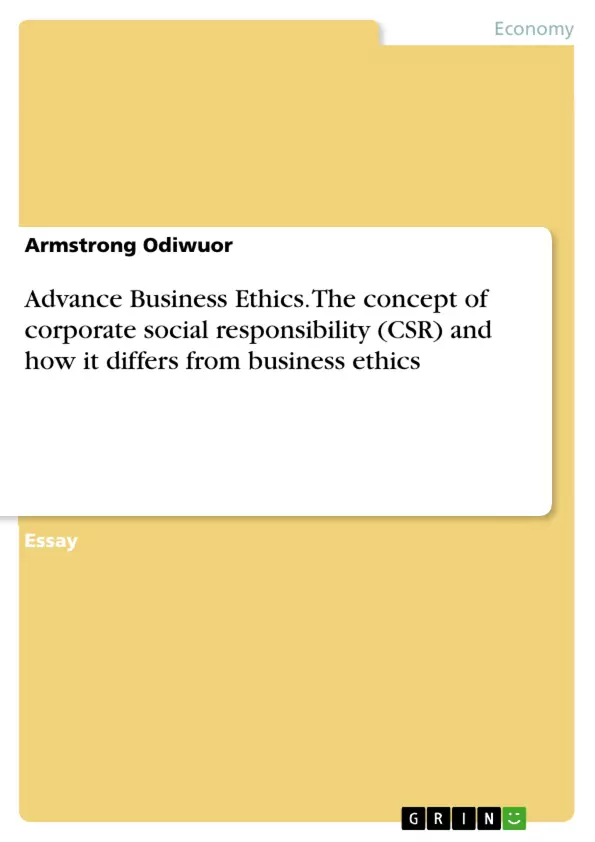This analysis paper delves into the intricate relationship between corporate social responsibility (CSR) and business ethics, elucidating their definitions, distinctions, benefits, drawbacks, and impacts. Corporate social responsibility encompasses an organization's commitment to integrating environmental and social concerns into its operations and interactions with stakeholders. It stands apart from philanthropy and charity, emphasizing a broader scope of initiatives aimed at achieving a balance between social, environmental, and economic imperatives. On the other hand, business ethics pertains to the ethical decision-making processes within a business, encompassing issues such as workplace discrimination, corporate governance, and insider trading.
This paper explores the benefits of CSR, including enhanced reputation, brand image, stakeholder relations, and employee satisfaction. However, it also scrutinizes the drawbacks, such as resource intensiveness, investor resistance, and potential profitability challenges. Moreover, it highlights the role of organizational values in shaping CSR initiatives and discusses the increasing importance of CSR in the global economy. Drawing from contemporary literature and empirical evidence, this paper provides insights into how CSR and business ethics intersect and influence organizational behavior and performance. It underscores the significance of aligning CSR initiatives with core business values and strategies to foster sustainable development and competitive advantage in today's dynamic business landscape.
Table of Contents
- Corporate social responsibility (CSR) is a broad business concept.
- Benefits of Corporate Social Responsibility
- Disadvantages and drawbacks of Corporate Social Responsibility
- The role of organizational values in Corporate Social Responsibility
- Impact of Corporate Social Responsibility in a global economy
Objectives and Key Themes
This text aims to provide a comprehensive understanding of corporate social responsibility (CSR) and how it differs from business ethics. It explores the concept of CSR, its benefits and drawbacks, and the role of organizational values in implementing successful CSR initiatives. The text also examines the impact of CSR in a global economy.
- Definition and scope of corporate social responsibility (CSR)
- Distinction between CSR and business ethics
- Benefits and drawbacks of CSR for organizations
- The role of organizational values in promoting CSR initiatives
- The impact of CSR in a globalized business environment
Chapter Summaries
The first chapter introduces the concept of corporate social responsibility (CSR) and its importance in modern business practices. It defines CSR as a management concept that integrates environmental and social concerns into business operations. The chapter also explores the difference between CSR and business ethics, highlighting their distinct focuses.
The second chapter delves into the benefits of adopting CSR initiatives. It discusses how CSR can improve a company's reputation, enhance brand image, attract investors, and motivate employees. The chapter also emphasizes the positive impact of CSR on a company's financial performance.
The third chapter focuses on the potential drawbacks of CSR. It examines the costs associated with implementing and maintaining CSR programs, the possibility of investor resistance, and the potential for negative impacts on profitability. The chapter argues that while CSR can be beneficial, companies need to carefully consider these drawbacks before implementing any initiatives.
The fourth chapter explores the role of organizational values in promoting successful CSR programs. It emphasizes that values serve as the foundation for creating a culture that supports and encourages ethical business practices. The chapter also discusses how customers are increasingly seeking companies with strong CSR commitments.
The fifth chapter examines the impact of CSR in a global economy. It acknowledges the growing challenges facing organizations in a globalized environment, such as bribery and corruption, environmental pollution, and differences in work conditions. The chapter highlights the importance of ethical standards in fostering trust and confidence among stakeholders.
Keywords
This text focuses on key concepts such as corporate social responsibility (CSR), business ethics, stakeholder engagement, environmental sustainability, ethical decision-making, organizational values, and the impact of CSR in a global economy. The discussion explores the relationship between these concepts and examines the benefits and challenges associated with implementing CSR initiatives.
- Arbeit zitieren
- Armstrong Odiwuor (Autor:in), 2024, Advance Business Ethics. The concept of corporate social responsibility (CSR) and how it differs from business ethics, München, GRIN Verlag, https://www.hausarbeiten.de/document/1452832


